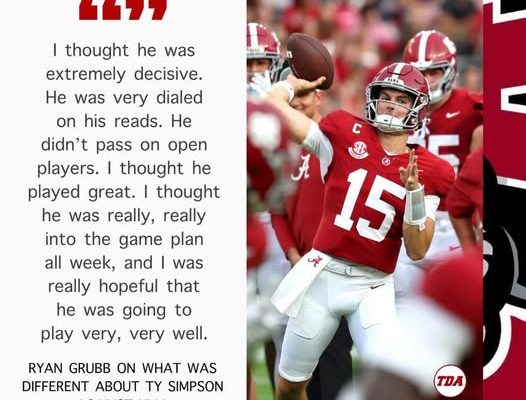When Alabama took the field against ULM, much of the conversation wasn’t about the final score, the margin of victory, or even the dominance that Crimson Tide fans have grown accustomed to seeing against opponents of that caliber. Instead, the spotlight turned toward the quarterback position and specifically Ty Simpson, who has often been overshadowed in a crowded Alabama quarterback room. Offensive coordinator Ryan Grubb made it clear after the game that something about Simpson was different this time, and those words carry more weight than some may initially realize. In Tuscaloosa, playing quarterback comes with perhaps the most pressure in all of college football. Every throw, every decision, every stride is analyzed not just by coaches but by fans, media, and NFL scouts alike. For Simpson, whose path to significant playing time hasn’t been as straightforward as some of his predecessors, that spotlight has at times been glaring, but Grubb’s assessment shows that the narrative around him may be shifting.
When a coordinator like Grubb speaks about “differences” in a quarterback, he’s not just talking about mechanics or stat lines. He’s pointing to growth, both mental and physical, that separates an average quarterback from one who can potentially lead a program like Alabama’s. Against ULM, the numbers alone tell part of the story—Simpson was efficient, poised, and commanded the offense with a level of confidence that wasn’t always there in earlier appearances. The game seemed to slow down for him, and that’s often the turning point for players who finally begin to click.
What Grubb highlighted was Simpson’s preparation, his demeanor, and his execution. The weeks leading up to a game like ULM can sometimes be tricky for top programs. Players know they’re expected to win big, and the risk is treating it as a tune-up rather than an opportunity to sharpen skills. Simpson, however, approached it like a defining moment. According to Grubb, his week of practice was sharper, more intentional, and full of focus. He wasn’t content with just running plays—he wanted to master them. That translated on game day into a quarterback who didn’t look tentative, didn’t look second-guessing, and didn’t look like he was waiting for someone else to step up. He owned the offense, and it was noticeable from the first series.
The difference also came in how Simpson responded to pressure. Alabama quarterbacks are measured by how they deal with adversity. Even in a lopsided win against an opponent like ULM, there are always a handful of plays where a defense disguises a blitz, where a protection breaks down, or where a receiver runs the wrong route. In previous outings, Simpson might have looked rattled in those moments. This time, Grubb noted, he looked calm. His footwork held up, his eyes stayed downfield, and he trusted his reads. That poise is what separates quarterbacks who can survive in Alabama’s system from those who can thrive.
Another thing that caught attention was his chemistry with receivers. For Alabama fans who have watched the evolution of this offense over the past decade, the connection between quarterback and wideout has been the heartbeat of the team. Think of Tua to DeVonta, Mac Jones to Waddle and Smith, Bryce Young to Jameson Williams. Simpson hasn’t always had that rhythm with his targets, but against ULM, you could see it developing. Timing routes were crisp, deep balls had touch, and his receivers played with a sense of trust that he would put the ball where it needed to be. That chemistry isn’t built in one week, but it often shows itself suddenly, in games where everything finally clicks, and that appeared to be the case here.
Grubb also talked about leadership. Leadership isn’t always about fiery speeches or chest-thumping moments on the sideline. It’s often about body language, tone, and quiet confidence. Simpson, according to his coordinator, carried himself differently. His teammates fed off it. Offensive linemen blocked with more certainty, receivers ran routes with sharper intent, and the running game flowed smoother because of his ability to balance the offense. That’s a ripple effect that only happens when a quarterback earns trust not by words alone, but by consistent actions on the field.
What fans should consider is the bigger implication of Grubb’s words. Alabama has options at quarterback, and every rep matters in defining the pecking order. When the offensive coordinator singles someone out as “different” in a good way, it’s not a casual observation—it’s a signal that he sees potential worth nurturing. For Simpson, that could mean more opportunities, bigger roles in high-stakes games, and a chance to cement himself in a quarterback battle that is far from settled.
It’s also worth reflecting on Simpson’s journey to this point. He was a highly touted recruit, coming into Alabama with lofty expectations, but he’s had to be patient. Sitting behind other talented players isn’t easy, especially when you’re used to being the star. The mental toughness required to stay ready, stay motivated, and keep improving without guaranteed playing time is enormous. What Grubb is recognizing now is not just performance, but resilience. Simpson didn’t fold under the weight of competition; he sharpened himself because of it. That’s the type of response coaches love to see, and it often foreshadows future breakthroughs.
From a technical standpoint, fans who watched closely likely saw improved accuracy and decision-making. There were fewer forced throws, fewer misreads, and more of a natural flow to his game. He wasn’t trying to do too much; he was simply executing what the offense asked of him. That maturity—playing within the system rather than against it—is critical in an Alabama offense that thrives on efficiency. Grubb’s system is built on precision, timing, and execution, and Simpson showed he’s starting to internalize those demands.
Now, the interesting part becomes how this performance translates moving forward. One game doesn’t define a career, but it can define a turning point. Will Simpson use this as a springboard to demand more snaps, or will it fade into another footnote in Alabama’s quarterback saga? Fans will debate that endlessly, and that’s part of what makes this moment so compelling. College football thrives on storylines like this—underdogs rising, potential being realized, and coordinators giving subtle but powerful endorsements.
There’s also the bigger picture of Alabama’s season. Every championship-caliber run requires depth and development at quarterback. Injuries happen, defenses adjust, and schedules get tougher. Having a quarterback like Simpson showing real progress is a massive advantage for Nick Saban’s program, even if he’s not the starter right away. Grubb’s comments reassure fans that Alabama’s QB room isn’t just deep in numbers but also in evolving talent.
This should also remind fans not to overlook the importance of coaching fit. Grubb’s arrival in Tuscaloosa was significant because of his track record of developing quarterbacks and building explosive offenses. The fact that Simpson looks “different” under his guidance isn’t coincidental—it’s a result of coaching synergy. Great coordinators bring out growth that players themselves may not even know they have. For Simpson, being in this system under this coordinator might be exactly what he needed to unlock his potential.
And of course, there’s the human side. College athletes are still young men navigating immense pressure, social media scrutiny, and personal expectations. For Simpson, hearing his offensive coordinator publicly praise his development and demeanor isn’t just a tactical comment—it’s a confidence booster. Confidence is contagious in sports, and when a player finally feels like his hard work is being recognized, it often propels him to new levels.
Alabama fans have long memories and high standards. They’ve seen legends come through the program, and they’re quick to compare current players to those who came before. But every quarterback’s journey is unique. What makes Simpson’s story interesting is that he’s carving his own path, one marked by patience, persistence, and gradual progress. Grubb’s words suggest that path is finally turning toward something meaningful.
As fans digest this win over ULM, it’s easy to brush it off as just another blowout against an overmatched opponent. But for those paying attention, it may have been much more. It may have been the night when Ty Simpson finally started to look like the quarterback Alabama recruited him to be. It may have been the game that gave his teammates and coaches the belief that he can be trusted in bigger moments. And it may have been the start of a new chapter in Alabama’s always fascinating quarterback saga.
What do you think—was this simply a strong outing against a weak opponent, or was it the beginning of something bigger for Ty Simpson? Did you see the same differences Ryan Grubb described, or are you waiting for him to prove it against tougher competition before buying in? Alabama fans, and college football fans in general, thrive on debates like this. Drop your thoughts below, share your take on Simpson’s performance, and let’s see if the Tide’s quarterback room is truly entering a new phase.



